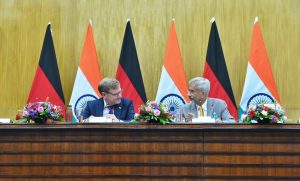German Foreign Minister Johann Wadephul visited India from September 1 to 3. This marked the first official visit to India by Germany’s top diplomat since he took office in May of this year, following the formation of the coalition government between the Christian Democratic Union (CDU) and Social Democratic Party (SDP).
While in India, Wadephul held discussions with his Indian counterpart, Dr. S. Jaishankar, and also met with Indian Minister of Commerce and Industry Piyush Goyal in New Delhi. He was accompanied by a high-level business delegation and a few members of the German parliament. Wadephul and his delegation traveled to New Delhi and Bangalore, which is often referred to as India’s tech capital and the “Silicon Valley of India.”
The visit comes as both countries celebrate 25 years of strategic partnership this year. India is regarded as Germany’s “strategic partner in the Indo-Pacific” and is seen as a “schlüsselstaat” (key country) in the global political arena by many German politicians.
Just before he departed for India, Wadephul emphasized the strength of the relationship: “With our Strategic Partnership, our academic cooperation and our cultural agreement dating back 25, 50 and almost 60 years respectively, India is a strategic partner for Germany across the board in the Indo-Pacific and plays a crucial role in the system of global partnerships.” He further talked about strengthening relations between the two countries in new areas. “We want to further deepen our relations across the entire spectrum and to strengthen them in particular in areas where potential has not yet been met. This is in our two countries’ mutual interest,” Wadephul stated.
During the German foreign minister’s visit, both sides centered their discussions on technology, business, space, and security, as well as the situation regarding the Ukraine-Russia war. Additionally, they talked about strengthening people-to-people ties and agreed to grant short-term visas for school and college visits. This initiative aims to enhance educational connections and promote student exchanges, encouraging more students to consider Germany as their destination for higher education. Currently, Indian students represent the largest group of foreign students in Germany, which is already a positive trend.
While discussing the Ukraine-Russia war, Wadephul urged New Delhi to press Moscow to return to peace negotiations over the Ukraine war. Washington and Brussels have not been able to gain much success in his regard, but India could address this matter, he said, adding that “the only demand is that weapons fall silent.”
Wadephul also spent some time explaining the EU approach to Russia, especially after the EU’s 18th sanctions package, which impacted Indian oil refineries, as India is one of the largest importers of Russian oil since 2022. Wadephul pointed out that, instead of using tariffs (as the United States has done), the EU imposed price caps “so as to ensure that Russia, which has to fund its war, will be less able to do so.”
More importantly, he said that the EU had taken “appropriate measures to prevent” Russian oil from making its way to Europe using “detours.” According to reports, Russian oil is processed in refineries in India and then exported to Europe as jet fuel and diesel. India’s Jamnagar Refinery exported refined products worth 17 billion euros to the EU between February 2023 and July 2025.
In addition to the Ukraine-Russia war, the EU-India trade deal was also the focus of the discussion. The EU and India started negotiations on a bilateral trade and investment agreement nearly two decades ago. However, after a few years of intense negotiations, the talks stalled in 2014. In June 2022, both sides relaunched negotiations for their free trade agreement and simultaneously initiated talks on a separate Investment Protection Agreement and an Agreement on Geographical Indications (GIs).
India wants the free trade deal to be accelerated, as Jaishankar noted during the meeting with his German counterpart. In this regard, he told Wadephul, “We are counting on your support.”
Earlier this year, in February, during the European Commission President Ursula von der Leyen’s visit to India, Prime Minister Narendra Modi had said that both governments “have asked our teams to work out a mutually beneficial bilateral free trade agreement by the end of this year.” Due to the heavy tariffs imposed by the Trump administration, both India and the EU need to reach a mutually beneficial agreement as soon as possible.
However, both sides will want to secure their economic interests before finalizing the agreement. The EU wants reduced import duties on cars and dairy products. It also wants New Delhi to commit to stricter labor as well as climate standards. On the other hand, India seeks to protect its farmers by avoiding strict environmental standards, along with retaining control over legal disputes that could arise in the future.
Germany and India aim to double their trade volume, which stood at 31 billion euros in 2024, and the EU-India Free Trade Agreement would make this goal attainable.
Germany is pivoting toward India, seeking to secure its interests and ensure a reliable ally in the Indo-Pacific region. Facing labor shortages – particularly in skilled sectors such as information technology – Germany sees potential in India to help address this gap. Conversely, India, as a leading exporter of services, can enhance its manufacturing sector by leveraging German industrial expertise. This creates the opportunity for a mutually beneficial partnership between the two countries in the long run.

































